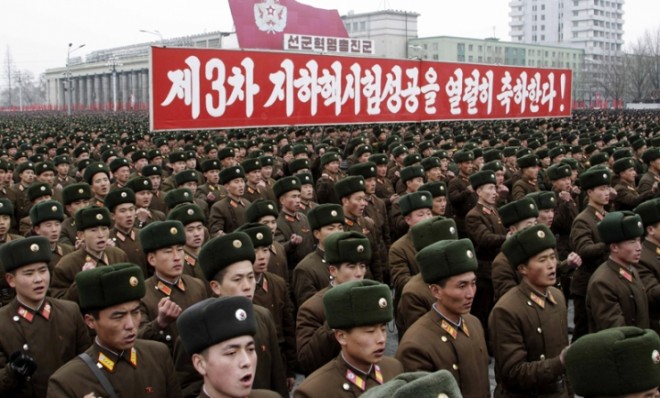Could North Korea really nuke the United States?
Facing tough new U.N. sanctions, Pyongyang threatens a "preemptive nuclear attack" against the United States

A free daily email with the biggest news stories of the day – and the best features from TheWeek.com
You are now subscribed
Your newsletter sign-up was successful
North Korea raised eyebrows (and heartbeats) this morning by threatening to use its "right to preemptive nuclear attack" against the United States in anticipation of new sanctions, which were later passed unanimously by the U.N. Security Council.
The hermit kingdom has remained defiant in the face of global criticism over its most recent nuclear test on Feb. 12, and the resolution, drafted by the United States and China, seeks to halt secret transactions by North Korean banks that could be funding the country's nuclear program, and increase scrutiny of suspicious sea and air shipments.
How worried should you be about North Korea's bellicose rhetoric? Is Kim Jong Un, recently seen palling around with tattooed basketball oddity Dennis Rodman, actually capable of hitting the United States with a nuclear missile?
The Week
Escape your echo chamber. Get the facts behind the news, plus analysis from multiple perspectives.

Sign up for The Week's Free Newsletters
From our morning news briefing to a weekly Good News Newsletter, get the best of The Week delivered directly to your inbox.
From our morning news briefing to a weekly Good News Newsletter, get the best of The Week delivered directly to your inbox.
The consensus is probably not — but North Korea is getting closer.
Judging from the seismic activity that resulted from North Korea's last nuclear test, the blast was about 6 or 7 kilotons, much stronger than the previous two tests in 2006 and 2009, but weaker than the 16-kiloton bomb that was dropped on Hiroshima. But as The Economist points out, size isn't everything. Indeed, North Korea's claims that the blast came from a "light and smaller" bomb — paired with its successful launch of a satellite into space using an Unha-3 rocket — has some in the international community nervous:
If the bosses in Pyongyang can master the critical skills required to direct a re-entry, the boffins say it is possible that such a rocket could be used to deliver a small nuclear warhead to the United States. [Economist]
Another key question: Whether North Korea is using plutonium, which is expensive and scarce, or highly enriched uranium, which would make building a large nuclear arsenal easier. An analyst for the Carnegie Endowment for International Peace told the AP that a "highly enriched uranium test would be a significant development," but "we don't yet have any evidence as to the device's design yield or whether it was made from plutonium or highly enriched uranium."
In an op-ed for CNN, Patrick M. Cronin, senior director of the Asian-Pacific Security Program at the Center for a New American Security, predicts that the "Unha-3 can reach at least Guam now and most likely will be able to reach Alaska and Hawaii and the West Coast of the continental United States within the coming year or two." Building a warhead small enough to fit on that missile, Cronin believes, would take at least three years.
A free daily email with the biggest news stories of the day – and the best features from TheWeek.com
Perhaps of more immediate concern is whether Pyongyang might sell nuclear material to enemies of the United States. Graham T. Allison Jr., director of the Belfer Center for Science and International Affairs at the Harvard Kennedy School, writes in a New York Times op-ed:
As the former secretary of defense Robert M. Gates put it, history shows that the North Koreans will "sell anything they have to anybody who has the cash to buy it." In intelligence circles, North Korea is known as "Missiles 'R' Us," having sold and delivered missiles to Iran, Syria and Pakistan, among others. [New York Times]
The truth is, no one outside of North Korea seems to know for sure exactly what North Korea's nuclear capabilities are. But the fact that China, usually one of the country's strongest allies, pushed for sanctions is a sign that nobody should take this situation lightly.
Keith Wagstaff is a staff writer at TheWeek.com covering politics and current events. He has previously written for such publications as TIME, Details, VICE, and the Village Voice.
-
 The Olympic timekeepers keeping the Games on track
The Olympic timekeepers keeping the Games on trackUnder the Radar Swiss watchmaking giant Omega has been at the finish line of every Olympic Games for nearly 100 years
-
 Will increasing tensions with Iran boil over into war?
Will increasing tensions with Iran boil over into war?Today’s Big Question President Donald Trump has recently been threatening the country
-
 Corruption: The spy sheikh and the president
Corruption: The spy sheikh and the presidentFeature Trump is at the center of another scandal